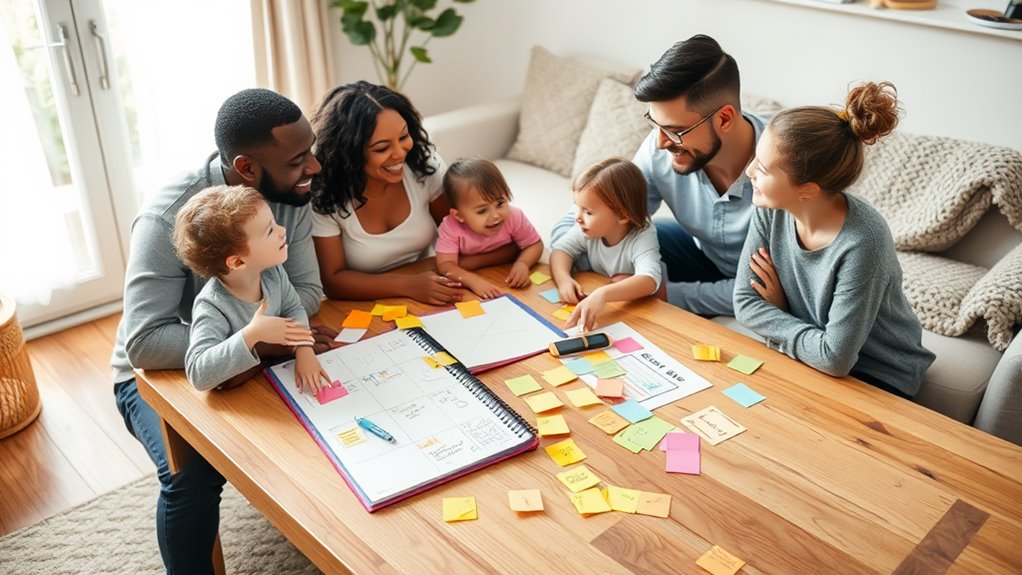Mindfulness Practices to Alleviate Parenting Stress
As a parent, you might often find yourself overwhelmed by the daily demands of family life. Mindfulness practices can serve as valuable tools to help you navigate this stress by bringing your focus back to the present moment. Techniques like deep breathing or mindful walking can ground you when chaos reigns. But how can these simple practices create lasting changes in your parenting approach? Exploring the various strategies available could reveal unexpected benefits that enhance your connection with your children and improve your overall well-being.
Understanding Parenting Stress
Parenting stress can creep in from various angles, whether it’s juggling work responsibilities, managing your child’s needs, or dealing with everyday challenges.
You might feel overwhelmed by the constant demands, like helping with homework while trying to make dinner. It can feel like you’re living in a circus, with everyone pulling you in different directions!
One big source of stress is the pressure to be perfect. You often compare yourself to other parents, thinking they’ve it all figured out. Spoiler alert: they don’t! Everyone has their struggles, even if they don’t show it.
Plus, kids can be unpredictable, and their moods can change faster than you can say “dinner time.”
Another stressor is the feeling of isolation. You might think you’re alone in this, but trust me, you’re part of a club that no one signed up for!
Knowing you’re not the only one feeling this way can be comforting. It’s okay to ask for help, whether it’s from friends, family, or even online groups.
The Role of Mindfulness
Mindfulness plays an essential role in managing parenting stress, offering a powerful tool to center yourself amidst the chaos. When you practice mindfulness, you focus on the present moment rather than worrying about what’s next on your to-do list. This shift in focus can help you feel less overwhelmed and more in control, even when your kids are bouncing off the walls!
Picture this: you’re knee-deep in toys, snack time, and endless questions. Instead of spiraling into a panic, take a moment to breathe and notice what’s around you. Feel the softness of a blanket or hear the laughter of your little ones. These small moments can remind you that parenting, while hectic, also has its joyful side.
Mindfulness isn’t just about quiet moments. It can be woven into your daily routine. When you wash dishes or drive to school, try to pay attention to your thoughts and feelings. Acknowledging them without judgment can lighten your load.
Before you know it, you’ll be more relaxed and ready to tackle whatever parenting adventure comes next. Embrace mindfulness, and watch how it transforms your parenting experience!
Breathing Techniques for Calm
How can something as simple as your breath bring about calm in the midst of parenting chaos? Believe it or not, your breath is a powerful tool you can use anytime, anywhere.
When you’re feeling overwhelmed, taking a moment to focus on your breathing can make a big difference.
Start by finding a comfortable spot, even if it’s just in the kitchen while the kids are playing. Close your eyes if you can, and take a deep breath in through your nose. Count to four as the air fills your lungs.
Then, hold it for a moment. Now, exhale slowly through your mouth, counting to six. Feel the tension melt away with each breath out.
Repeat this a few times. You’ll notice that your shoulders start to relax, and your mind clears up a bit. It’s like giving your brain a mini-vacation!
Guided Meditation for Parents
After practicing those breathing techniques, you might find yourself ready to explore another powerful tool: guided meditation. This practice offers you a chance to pause and center yourself, especially when parenting gets hectic. Imagine finding a quiet spot, maybe your cozy chair or even the bathroom for a few moments of peace.
You can start by finding a guided meditation online or through an app. Just hit play, close your eyes, and let the soothing voice lead you through calming visuals and gentle reminders to relax. Picture a peaceful beach or a quiet forest. As you listen, you’ll feel your body unwind, and your mind clear.
Guided meditations usually last anywhere from five to twenty minutes, so you can easily fit one into your day. It’s like a mini-vacation for your brain!
Plus, it helps you reconnect with yourself, making you more patient and focused when dealing with the little ones. So, give it a shot! You might just discover that a little guided meditation can turn your chaotic day into a calmer, more centered one.
After all, happy parents often lead to happy kids!
Mindful Walking Practices
One great way to incorporate mindfulness into your day is through mindful walking. It’s simple! Just step outside, find a nice spot, and start walking. Pay attention to each step you take. Feel the ground beneath your feet and notice how your body moves. You might even feel like a graceful gazelle—well, maybe a little less graceful, but you get the idea!
As you walk, take a moment to notice your surroundings. What colors do you see? What sounds can you hear? Is that a bird singing or just a neighbor’s dog barking? Engaging your senses helps you stay present and can clear your mind of the daily chaos that comes with parenting.
If thoughts about your to-do list pop up, gently bring your focus back to your breath and the rhythm of your steps.
Try to embrace the moment, even if it feels a bit silly at first. You’re not just walking; you’re practicing mindfulness!
Journaling for Reflection
Many parents find that journaling is a powerful tool for reflection and stress management. It’s like having a conversation with yourself, but without anyone interrupting! When you put your thoughts on paper, you create a safe space to express your feelings. You can write about your day, the challenges you face, or even the joyful moments that made you smile.
Journaling helps you process your emotions, making it easier to understand what’s bothering you. You might discover patterns in your thoughts or feelings that you didn’t notice before. Plus, it’s a great way to let off some steam! When you write, you can vent about that tantrum at the grocery store or the endless laundry pile without judgment.
You don’t need to be Shakespeare; just jot down your thoughts in a way that feels natural. Try to set aside a few minutes each day, maybe with a cup of tea, and let your thoughts flow.
You might find that as you write, your stress levels drop, and your clarity improves. So grab that notebook, and start your journey of reflection—your inner self will thank you!
Engaging in Mindful Play
Mindful play transforms the ordinary into extraordinary moments of connection with your child. When you engage fully in playtime, you’re not just passing the time—you’re creating memories that will last. Put down your phone, take a deep breath, and immerse yourself in their world.
Whether it’s building a fort or pretending to be superheroes, your focused attention makes all the difference.
Try to notice the little things during play. Listen to their laughter, watch their expressions, and feel the joy radiate from their excitement. This isn’t just about having fun; it’s about being present. You’ll find that even the simplest games can become meaningful experiences.
And don’t worry about being perfect. If you trip over a toy or your superhero cape gets tangled, laugh it off! Your child will appreciate the silliness, and it’ll remind them that life doesn’t always have to be serious.
Mindful play can help ease your parenting stress, making those hectic days feel lighter. So grab a toy, a book, or even a simple ball, and let the playfulness unfold.
Those moments of connection will recharge both you and your child, creating a bond that’s truly special.
Establishing a Daily Routine
After enjoying those moments of mindful play, establishing a daily routine can further enhance your connection with your child while reducing stress. A routine provides a sense of stability, making your days feel more predictable and manageable. Kids thrive on consistency, and knowing what to expect can help them feel secure. Plus, it gives you a chance to sneak in some quality time together!
Start by setting a simple schedule for daily activities. You can create a morning routine that includes getting dressed, having breakfast, and maybe even a short chat about the day ahead. In the afternoons, consider designating time for homework, chores, or fun family activities. Don’t forget to include some downtime too!
You might think routines sound boring, but they can be fun! Use colorful charts or fun stickers to track daily tasks. Celebrate small victories together, like finishing chores or sticking to the schedule.
You’ll find that it’s not just about getting things done; it’s about sharing those moments with your child, turning ordinary tasks into special memories. So, grab your favorite planner, and start crafting that routine—it’s a game changer!
Using Affirmations and Mantras
Embracing the power of affirmations and mantras can greatly shift your mindset as a parent. When you repeat positive phrases, you train your brain to focus on the good stuff instead of the chaos. You might say things like, “I’m doing my best,” or “I can handle this.” These simple statements remind you that you’re not alone in this parenting adventure, even when it feels overwhelming.
Start your day with a few minutes of saying your favorite affirmations. You can do this while sipping coffee or even in the shower—who doesn’t love a good mantra while washing their hair, right?
You’ll notice that these words start to sink in, boosting your confidence and reducing stress.
Creating a Supportive Environment
Creating a supportive environment at home can considerably alleviate parenting stress and foster a sense of calm. You mightn’t realize it, but the space around you affects your mood and energy.
Start by decluttering your home—less mess means less stress! Create cozy spots where you can unwind, like a reading nook or a comfy chair. Add some plants; they’re not just pretty, they help improve air quality too!
Next, involve your kids in the process. Let them help decorate their rooms or choose family activities. This way, everyone feels included, and it’s a great bonding experience.
Plus, when kids have a say, they’re more likely to follow house rules—win-win!
Don’t forget to set boundaries, too. Make sure everyone knows when it’s quiet time or when devices need to be put away. A little structure can go a long way in reducing chaos.
Lastly, sprinkle in some fun! Game nights or family movie nights break up the routine and create lasting memories.
Practicing Gratitude Daily
When you make a habit of practicing gratitude daily, it can transform your perspective on parenting and life in general. Instead of focusing on what’s going wrong, you’ll start noticing the little things that bring joy. Imagine waking up and thinking, “I’m thankful for my child’s laughter,” or “I appreciate the cozy home we have.” These thoughts can shift your mood from stressed to thankful in no time!
You don’t need to write a novel—just jot down three things you’re grateful for each day. It could be as simple as a delicious cup of coffee or a moment of quiet while your kids are napping. You might even want to share these moments with your family during dinner. Who knows, it could become a fun tradition!
Gratitude isn’t just about big events; it’s about recognizing those everyday wins. This practice can help you feel more connected to your family, reduce stress, and improve your overall happiness.
Plus, when you model gratitude, you teach your kids to appreciate life too. So grab a journal, a sticky note, or even your phone, and start noticing the good stuff! You might be surprised by how much there’s to be thankful for.
Seeking Professional Guidance
In times of overwhelming parenting stress, seeking professional guidance can be a game changer. You might think getting help is a sign of weakness, but let me assure you, it’s a brave step.
Whether it’s talking to a therapist, attending parenting classes, or joining a support group, reaching out can bring you relief.
Professional guidance offers fresh perspectives. These experts can provide you with tools and strategies tailored just for you. Imagine having someone in your corner, cheering you on and helping you tackle those tricky parenting moments.
You’ll learn how to manage your stress more effectively, find balance, and even discover new ways to connect with your kids.
Plus, let’s face it, parenting is tough! Sometimes, just sharing your feelings can lighten the load. A good therapist or group can remind you that you’re not alone in this journey.
So, don’t hesitate to seek that support. It’s like having a trusty map when you’re lost in the woods. With the right guidance, you can navigate through the challenges of parenting with more confidence and ease.
Who knows? You might even find a bit of joy along the way!




